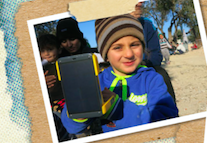
“There is nothing left in Iraq for us, no schools, no supermarkets, no food. Some organizations gave us food sometimes. Last year, we had to hide in the mountains for five months and some planes flew overhead and dropped food down, but it was never enough. We were always so tired, so hungry, so thirsty.” ~Rukia
Rukia (whose name has been changed) is a 39-year-old mother, traveling with her two daughters, 15 and 17, and members of their extended family, including four young children (2-year-old Zainab, 3-year-old Dleen, 5-year-old Alaa and 10-year old Noora).
Members of a highly persecuted minority, Rukia and her family fled violence from armed groups in Iraq. They were forced to live in the mountains for five months last year during periods of intense fighting.
“The journey to Greece was really hard. I thought we would all die in the boat. It filled up with water and sank and we were in the water for twenty minutes before someone saved us. It was the coldest I have ever felt.” ~Rukia
Rukia and her family are hoping to reunite with family living in Germany. Mobile phones have become their lifeline, a means of connecting and communicating with their loved ones and getting information.
Save the Children gave Rukia a WakaWaka solar flashlight and smartphone charger to help keep her remain connected to her loved ones. The organization is providing WakaWaka flashlights and chargers to refugees through a targeted distribution, to ensure the solar devices reach the most vulnerable children and families caught in humanitarian crises.
“We use [mobile phones] to talk to our families,” said Rukia. “I talk to my husband about the journey we’re taking, letting him know that we’re all safe. I use the internet to find out about the news and what is happening, to get information. Some people in my group make short videos to send to their families so they can see their faces. My children use the phone all the time to talk to our family and their dad. It’s been a really long time since we’ve seen our family who are in Germany.”
Save the Children will distribute 1,100 WakaWaka Power+ solar flashlights and chargers. The Power+ can be used to charge both mobile phones and tablets through a USB connection. They can be charged by solar power, but also by a main power supply for later use. The device’s powerful flashlight can be used as a light source at night in refugee camps, which often have little or no lighting, or as a guiding light as they travel at night along the transit route, which includes walking through fields and across borders in pitch black. “I really needed something like this charger,” said Rukia, “so I can keep in touch with my family.”
Save the Children has been working working on Lesbos since September 2015 and is now operational in Idomeni, Samos, Chios, Kos and Leros. The organization has reached over 230,000 refugees to date, including more than 65,000 children.
PHOTOS: Kate O. Sullivan/Save the Children